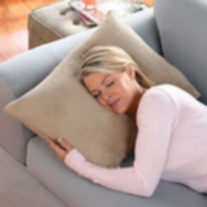美國神經學專家研究發現,午睡有助促進人的復雜記憶,使思維更開闊、更具創造性;而人們如果在“慢波睡眠”即深度睡眠階段遭到打擾,則可能會忘記前一天獲知的事情。紐約市立大學認知神經科學博士威廉?菲什拜因和一名研究人員以20名英語為母語的大學生為研究對象,探求午睡對他們通過記憶把所學事物相聯系能力的影響。測試結果表明,午睡過的學生能夠總結出已學詞語含義上的共同特點,做出正確推斷選擇,得分高于未午睡學生。

 |
|
Take a nap. Interrupting sleep seriously disrupts memory-making, compelling new research suggests. But on the flip side, taking a nap may boost a sophisticated kind of memory that helps us see the big picture and get creative.
|
Just in time for the holidays, some medical advice most people will like: Take a nap. Interrupting sleep seriously disrupts memory-making, compelling new research suggests. But on the flip side, taking a nap may boost a sophisticated kind of memory that helps us see the big picture and get creative.
"Not only do we need to remember to sleep, but most certainly we sleep to remember," is how Dr. William Fishbein, a cognitive neuroscientist at the City University of New York, put it at a meeting of the Society for Neuroscience last week.
Good sleep is a casualty of our 24/7 world. Surveys suggest few adults attain the recommended seven to eight hours a night.
Way too little clearly is dangerous: Sleep deprivation causes not just car crashes but all sorts of other accidents. Over time, a chronic lack of sleep can erode the body in ways that leave us more vulnerable to heart disease, diabetes and other illnesses.
But perhaps more common than insomnia is fragmented sleep — the easy awakening that comes with aging, or, worse, thesleep apnea that afflicts millions, who quit breathing for 30 seconds or so over and over throughout the night.
Indeed, scientists increasingly are focusing less on sleep duration and more on the quality of sleep, what's called sleep intensity, in studying how sleep helps the brain process memories so they stick. Particularly important is "slow-wave sleep," a period of very deep sleep that comes earlier than better-known REM sleep, or dreaming time.
Fishbein suspected a more active role for the slow-wave sleep that can emerge even in a power nap. Maybe our brains keep working during that time to solve problems and come up with new ideas. So he and graduate student Hiuyan Lau devised a simple test: documenting relational memory, where the brain puts together separately learned facts in new ways.
First, they taught 20 English-speaking college students lists of Chinese words spelled with two characters — such as sister, mother, maid. Then half the students took a nap, being monitored to be sure they didn't move from slow-wave sleep into the REM stage.
Upon awakening, they took a multiple-choice test of Chinese words they'd never seen before. The nappers did much better at automatically learning that the first of the two-pair characters in the words they'd memorized earlier always meant the same thing — female, for example. So they also were more likely than non-nappers to choose that a new word containing that character meant "princess" and not "ape."
"The nap group has essentially teased out what's going on," Fishbein concludes.
These students took a 90-minute nap, quite a luxury for most adults. But even a 12-minute nap can boost some forms of memory, adds Dr. Robert Stickgold of Harvard Medical School.
Conversely, Wisconsin researchers briefly interrupted nighttime slow-wave sleep by playing a beep — just loudly enough to disturb sleep but not awaken — and found those people couldn't remember a task they'd learned the day before as well as people whose slow-wave sleep wasn't disrupted.
That brings us back to fragmented sleep, whether from aging or apnea. It can suppress the birth of new brain cells in the hippocampus, where memory-making begins — enough to hinder learning weeks after sleep returns to normal, warns Dr. Dennis McGinty of the University of California, Los Angeles.
To prove a lasting effect, McGinty mimicked human sleep apnea in rats. He hooked them to brain monitors and made them sleep on a treadmill. Whenever the monitors detected 30 seconds of sleep, the treadmill briefly switched on. After 12 days of this sleep disturbance, McGinty let the rats sleep peacefully for as long as they wanted for the next two weeks.
The catch-up sleep didn't help: Rested rats used room cues to quickly learn the escape hole in a maze. Those with fragmented sleep two weeks earlier couldn't, only randomly stumbling upon the escape.
None of the new work is enough, yet, to pinpoint the minimum sleep needed for optimal memory. What's needed may vary considerably from person to person.
"A short sleeper may have a very efficient deep sleep even if they sleep only four hours," notes Dr. Chiara Cirellia of the University of Wisconsin, Madison.
But altogether, the findings do suggest some practical advice: Get apnea treated. Avoid what Harvard's Stickgold calls "sleep bulimia," super-late nights followed by sleep-in weekends. And don't feel guilty for napping.
(Agencies)

Vocabulary:
on the flip side: 另一方面,另一個角度
sleep apnea: 睡眠窒息
(英語點津 Helen 編輯)